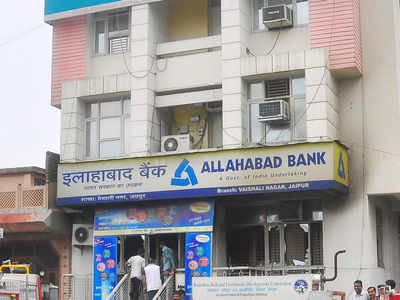- News
- Business News
- India Business News
- Half of merging banks had ‘foreign’ origins
Trending
This story is from August 31, 2019
Half of merging banks had ‘foreign’ origins
While the big bang merger will bring in much needed economies of scale in the operations of some of the smaller banks, it will also result in erasing the identity of six banks, some of which are more than a century old.

(Representative image)
Key Highlights
- Allahabad Bank was founded in Allahabad by a group of Europeans in 1865
- In 1920, the bank was acquired by P&O Banking Corporation and relocated to Kolkata
MUMBAI: While the big bang merger will bring in much needed economies of scale in the operations of some of the smaller banks, it will also result in erasing the identity of six banks, some of which are more than a century old.
The oldest is Kolkata-based Allahabad Bank, which is also the oldest joint stock company in India. Unlike other nationalised banks which happened to have Indian promoters, this institution was founded in Allahabad by a group of Europeans in 1865.In 1920, the bank was acquired by P&O Banking Corporation and relocated to Kolkata. Its ownership moved into Indian hands before nationalisation.
Like the bank it is merging into (PNB), Oriental Bank of Commerce was established in Lahore a few years before Independence in 1943 by a businessman, Rai Bahadur Lala Sohan Lal. In 1945, the bank was acquired by the Thapar Group. Two years later, following Partition, the bank’s head office was shifted from Lahore to Amritsar. It then relocated to New Delhi in 1951. The bank was nationalised in 1980.

Syndicate Bank was founded in 1925 in Udupi in coastal Karnataka as Canara Industrial and Banking Syndicate by Upendra Ananth Pai, a businessman, Vaman Kudva, an engineer, and Dr T M A Pai, a physician. The bank was founded in the same district as three other nationalised banks — Canara Bank,
Corporation Bank, which will merge into Union Bank, was founded in Udupi by Haji Abdullah Haji Kasim Saheb Bahadur in 1906. However, after a decade, the bank’s operations were handled by businessmen from the Goud Saraswat Brahmin community. Incidentally, Syndicate and Canara Bank were also set up by members of the same community.
Andhra Bank was born out of the nationalistic movement during the freedom struggle. The bank was founded in 1923 in Machilipatnam, a port town in coastal Andhra Pradesh, by Bhogaraju Pattabhi Sitaramaiah. Bank of Baroda, which acquired Vijaya Bank and Dena Bank, had announced last month that in order to preserve the rich heritage of all the three brands, museums are being planned at heritage sites to showcase the history of the entities.
The oldest is Kolkata-based Allahabad Bank, which is also the oldest joint stock company in India. Unlike other nationalised banks which happened to have Indian promoters, this institution was founded in Allahabad by a group of Europeans in 1865.In 1920, the bank was acquired by P&O Banking Corporation and relocated to Kolkata. Its ownership moved into Indian hands before nationalisation.
Like the bank it is merging into (PNB), Oriental Bank of Commerce was established in Lahore a few years before Independence in 1943 by a businessman, Rai Bahadur Lala Sohan Lal. In 1945, the bank was acquired by the Thapar Group. Two years later, following Partition, the bank’s head office was shifted from Lahore to Amritsar. It then relocated to New Delhi in 1951. The bank was nationalised in 1980.

United Bank of India, too, had its origins outside the borders of present day India. UBI was formed by the merger in 1950 of four banks of British Bengal. The banks were Comilla Banking Corporation (founded by N C Dutta in 1914 in present day Bangladesh), Bengal Central Bank (set up by J C Das in 1918), Comilla Union Bank and Hooghly Bank.
Syndicate Bank was founded in 1925 in Udupi in coastal Karnataka as Canara Industrial and Banking Syndicate by Upendra Ananth Pai, a businessman, Vaman Kudva, an engineer, and Dr T M A Pai, a physician. The bank was founded in the same district as three other nationalised banks — Canara Bank,
Corporation Bank and Vijaya Bank.
Corporation Bank, which will merge into Union Bank, was founded in Udupi by Haji Abdullah Haji Kasim Saheb Bahadur in 1906. However, after a decade, the bank’s operations were handled by businessmen from the Goud Saraswat Brahmin community. Incidentally, Syndicate and Canara Bank were also set up by members of the same community.
Andhra Bank was born out of the nationalistic movement during the freedom struggle. The bank was founded in 1923 in Machilipatnam, a port town in coastal Andhra Pradesh, by Bhogaraju Pattabhi Sitaramaiah. Bank of Baroda, which acquired Vijaya Bank and Dena Bank, had announced last month that in order to preserve the rich heritage of all the three brands, museums are being planned at heritage sites to showcase the history of the entities.
End of Article
FOLLOW US ON SOCIAL MEDIA















